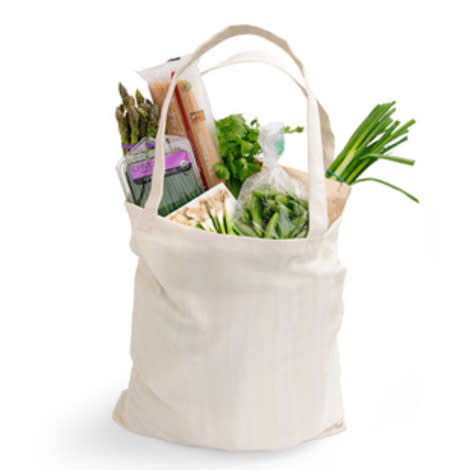3 "Green" Habits that Can Make You Sick

By Kerri-Ann Jennings, M.S., R.D., Associate Nutrition Editor, EatingWell Magazine
In the past few years I've made some "green" swaps. I usually bring my own bag when I go grocery shopping, I choose tap water over bottled, I ditched paper towels and conventional sponges for cloth dishrags. But when Karen Asp wrote about these eco-friendly practices in EatingWell Magazine, I learned that sometimes going green isn't all that clean. Find out some of the hidden dangers in these green swaps and, more importantly, how to do them right so that you're being good to the environment and to your health.
Must-Read:
7 Simple Ways to Detox Your Diet and Your Home
9 Green Products for a Healthy Kitchen
Swap #1: You use reusable bags at the grocery store.
Most plastic bags don't biodegrade, so reusable ones are a smart option. But when researchers tested reusable bags shoppers were using, almost all had large numbers of fecal bacteria, according to a 2011 study in Food Protection Trends.
"Some bags had more E. coli than underwear," says Charles P. Gerba, Ph.D., study coauthor and environmental microbiologist at the University of Arizona in Tucson. Even worse? Bacteria increased tenfold when used bags sat in warm car trunks for two hours.
The solution: Wash bags regularly--and after each use if they carried meat products. "Most of the bacteria came from meat," Gerba says. Machine washing in hot water is best, so Gerba recommends cloth bags.
Must-Read: 5 Tips for a Greener Diet
Swap #2: You've replaced sponges with dishrags.
Dishrags are stored in damp, warm environments, where germs love to breed. Plus most people don't routinely disinfect them. More than 75 percent of dishrags were found to be infected with coliform bacteria--a group that includes E. coli and Salmonella--as found in one 2011 study from NSF International, an independent public health organization.
The solution: Replace dishrags every day or two. Wash dirty ones with bleach in hot water. Or use a washing machine with the NSF (National Sanitation Foundation) certification mark, which guarantees that it will sanitize and remove virtually all germs, eliminating the need for bleach.
Related: 5 Germy Places in Your Kitchen You Should Clean Up
Swap #3: You ditched disposable water bottles for a reusable one.
Using your own water bottle can keep 92 plastic ones from heading to the landfill each year, but make sure to keep it clean. If that bottle has a cap with a spout, your hands could corrupt it with germs when you pull it open.
The solution: Wash the bottle often, especially the cap, Gerba says. If you're sharing it, wash it after each use. Even better, use a bottle with a screw top, which doesn't pose as big a threat for germs.
Don't Miss: What's the Most Eco-Friendly Milk Container to Buy?
What eco-friendly swaps have you made?
By Kerri-Ann Jennings

Kerri-Ann Jennings, a registered dietitian, is the associate nutrition editor of EatingWell Magazine, where she wields her master's degree in nutrition from Columbia University writing and editing news about nutrition, health and food trends. In her free time, Kerri-Ann likes to practice yoga, hike, bake and paint.
More from EatingWell:
